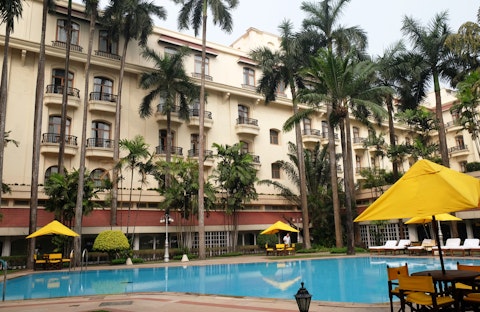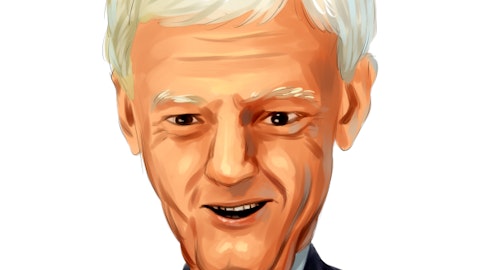Ryman Hospitality Properties, Inc. (NYSE:RHP) Q2 2023 Earnings Call Transcript August 5, 2023
Operator: Welcome to Ryman Hospitality Properties Second Quarter 2023 Earnings Conference Call. Hosting the call today from Ryman Hospitality Properties are Mr. Colin Reed, Executive Chairman; Mr. Mark Fioravanti, President and Chief Executive Officer; Ms. Jennifer Hutchison, Chief Financial Officer; Mr. Patrick Chaffin, Chief Operating Officer; and Mr. Patrick Moore, Chief Executive Officer. Opry Entertainment Group, this call will be available for digital replay. The number is 800-756-0554 with no conference ID required. At this time, all participants have been placed on a listen-only mode. It is now my pleasure to turn the conference over to Ms. Jennifer Hutchinson. Please go ahead, ma’am.

Zvonimir Atletic/Shutterstock.com
Jennifer Hutcheson: Good morning. Thank you all for joining us today. This call may contain forward-looking statements as defined in the Private Securities Litigation Reform Act of 1995, including statements about the company’s expected financial performance. Any statements we make today that are not statements of historical fact may be deemed to be forward-looking statements. Words such as believes or expects are intended to identify these statements, which may be affected by many factors, including those listed in the company’s SEC filings and in today’s release. The company’s actual results may differ materially from the results we discuss or project today. We will not update any forward-looking statements, whether as a result of new information, future events or any other reason.
We will also discuss non-GAAP financial measures today. We reconcile each non-GAAP DIP (ph) measure to the most comparable GAAP measure and exhibit to today’s release. I will now turn the call over to Colin.
Colin Reed: Thank you, Jennifer, and good morning, everyone. I want to start off this morning’s earnings call by somewhat breaking from the tradition of spending time talking about the last quarter. Of course, we’re very pleased with the last quarter, but it’s the future that really excites us. So let me tell you, why? 20 years ago, we decided to build a hospitality brand primarily focused on the group segment. We did this because we had discovered that there were tens of thousands of large groups that rotate market to market year-by-year. We built world-class physical assets backed up by a people focused culture that over time build loyalty amongst our customers. The consequence was that we gained market share and for those investors who have been with us for this journey will know we’ve expanded and refined most of our hotels over the last decade as we grew demand.
Financially, our performance has been substantially different from our peers. In fact, our company has significantly outperformed the FTSE NAREIT Lodging sector index over the last 20 years, and when you look at the average returns of the same index, whether it’s on a year-to-date basis, a one-year, three-year, five-year, 10-year, we’ve substantially outperformed this index in each period of measurement. Now this is not by luck. This is because we have a differentiated strategy that enters into contracts with our large group customers and provide really exciting experiences to the leisure customers, and they, in turn, reward us with their loyalty. The consequence of which has resulted in lower annualized earnings volatility and higher annualized growth than our peers.
So we are, after a once in a lifetime pandemic posting results that are mostly across the board records, and as Mark will describe, bookings and lead volumes that are really quite impressive and revenue on the books for next year and the years following at levels that exceed historical performance. COVID-decimated many farmers and created extraordinary damage to humanity. But in some ways, it made us a stronger company. We went out of our way to nurture and care for the meeting planner, evidenced by the tremendous re-bookings we achieved from the canceled room nights. We reengineered our organization and deployed almost $500 million in new capital while others shut up shop. We have emerged from COVID a stronger company as our quarterly earnings illustrate.
But the thing that excites me is what we can do with our businesses over the years ahead. Next week, we will be with our Board and I suspect most of the conversation will be focused on the years ahead of us. Our hotel business has and is showing strong rate growth as a consequence of the attributes of our products and the strength of demand. Look, forward bookings and lead volumes have us very excited and we’ve been sharing with our Board the many options we have to grow our business. We’re working on rooms expansions of certain hotels, convention space expansion, replicating SoundWaves in several markets, sports bar expansions as well as food and beverage repositioning all at our existing hotels as we expand and refine supply to accommodate the demand we are building.
So as I said, next week, we will preview these opportunities with our Board. And between now and early December, we will be refining proformas and prioritization, and then we will share this plan in some detail at an Investor Day that we plan to hold sometime mid-first quarter of next year so that we can lay out our growth plans primarily for our hotel business, but also give you a glimpse of what we expect to do with our exciting entertainment business. Now right now, we’ve identified about somewhere between 15 and 20 projects that we believe will materially grow profitability that we estimate that we’ll acquire about $1 billion of new capital, and by the way, that number I’ve just explained to you excludes the plans that we’re developing for the JW Marriott Hill Country.
Unlike most of the hospitality REIT sector, we have a very strong record of creating value for our shareholders and the plans that we are developing and the strategy that we have in place leads us to the conclusion that the future looks extremely exciting. Now for the quarter. As Mark and Jim will discuss, our quarter came in almost exactly as our operating plan called for despite the shocking accident at our Colorado hotel, and we set records in many areas of our business. The quarter was highlighted by the acquisition of the JW Marriott Hill Country, which we’re very excited about, and Mark will talk about that in a minute. Candidly, we’ve tried to buy this hotel several times over the last eight years and we are pleased that we were able to move quickly to facilitate this purchase.
And I’d like to thank the investors and bondholders who came into our company at the time of purchase for having the confidence in us. San Antonio is a large city with incredible growth characteristics. In fact, from 2020 to ’21, San Antonio experienced the largest population growth in absolute terms of any city in the United States and during that time, the GDP of San Antonio grew at the fifth highest rate in the country. There’s a lot of upside potential for this hotel and even though the hotel is performing extremely well, and we look forward to really rimanizing this hotel in the coming period. Over the last several days, we’ve gone under contract to purchase an adjacent 41 acres of real estate that significantly helps us to be able to expand this hotel over time and then introduce this after into the rotational offering for our group customers, and Patrick and his high quality team are currently building the growth thesis for this world-class asset, which we’ll share with you in a few months.
Now finally, let me just tell you what excites me about our entertainment business. First of all, the core business continues to get stronger and if you exclude our new Block 21 assets, which delivered very good results in the second quarter, adjusted EBITDA increased year-over-year by 21% on an 11% increase in revenue. The Old Red brand also delivered record results as did the Grandeur and the Ryman. From a growth perspective, we’re making headway in Las Vegas with our all red that we’re building on the strip. But it looks like opening will occur in very early in 2024, which is a modest shift in the schedule due to a permit delay that we fortunately now have completely resolved. As you all know, we also announced a long-term branding deal with Luke Combs.
Luke is an extraordinary entertainer with international appeal and we will be converting the Wildhorse (ph) into a four-part multifaceted entertainment destination here in Nashville, which when complete, will be quite different from the bars you see in this town. So here we are, our consolidated business operating at record levels and a balance sheet that has delivered materially over the last year. For us, the dilemma is not how we grow, but what levers we pull first. And I want to just finish my section here by saying I’m extremely proud of the team we have here at Ryman and their collective professionalism and understanding of our business and the future looks awfully, awfully exciting. So Mark, let’s talk about the second quarter.
Mark Fioravanti: Thanks, Colin. The company had another excellent quarter with a continuation of the great momentum we saw in the first quarter, achieving record performances in a number of areas. In addition, we are excited about the value creation opportunities the JW Marriott Hill Country presents at both the property and portfolio levels. Starting with our hotel business, we continue to see strength in the group segment as we traveled approximately 528,000 group room nights in the quarter, 3.5% more than the comparable period in 2022 and nearly a 98% recovery versus 2019 pre-pandemic levels. Across the board in both group and transient, we continue to see strong rate performance as group and transient ADR were both up 5% versus the prior year quarter and $16.7 million and 37.9%, respectively, compared to the second quarter of 2019.
Both segments set new all-time records for ADR, driving record second quarter hospitality revenue. Outside the room spending this quarter saw continued strength with an increase of over 5% compared to the year ago period. Despite an uncertain macro environment, we delivered hospitality adjusted EBITDAre of $152.7 million in the quarter, which was the second highest performance in the company’s history, just 1.5% behind the year ago period. While there was a 200 basis point margin decline compared to the same period last year, this quarter’s performance was solid as we faced some tough comparisons to the prior year quarter. Coming off the Omnicron impacted first quarter, the second quarter of 2022 is the highest EBITDAre and margin quarter on record, driven in part by Omnicron-related re-bookings, attrition and cancellation fee collections and incentive management fee expense timing.
Attrition and cancellation fees in the most recent quarter were down by almost one-third or $5 million on a year-over-year basis, illustrating the continued return of the group customer. Likewise, as our portfolio has generated higher levels of profitability, management fee expenses increased commensurately. Our second quarter results included over $4 million more in recognized incentive management fees compared to the year ago period. While these dynamics have a negative impact on comparable margins, they are favorable signs for the group segment in our business. We anticipate a similarly challenging year-over-year comparison in the third quarter as well and then reaching more favorable comparisons in the fourth. In addition to these year-over-year dynamics, the Gaylord Rockies performance in the quarter was negatively impacted by the tragic May 6 collapse of the HVA system at the hotels indoor pool.
Gas volumes, primarily in the transient segment were impacted in the weeks following the incident, but have continued to recover. We estimate this incident impacted the Rockies second quarter profitability by approximately $2 million and we have an ongoing business interruption claim, which we hope to collect by year-end. As we look to the remainder of the year, we’re reiterating our hospitality EBITDAre and Entertainment segment EBITDA outlook with the addition of the JW Hill Country for the back half of the year, thus raising our adjusted EBITDAre guidance for the benefit of the new property. Jennifer will detail our outlook shortly. As we look beyond 2023, we continue to see no deterioration in the key leading indicators we track. We’re again pleased with group sales production in the quarter as we booked nearly 652,000 gross group room nights, which is up 8.4% compared to the year ago period.
If you exclude Omnicron-related re-bookings from the second quarter production last year, production was up approximately 17% year-over-year. We continue to prioritize ADR in our sales production, leveraging the capital investments we’ve made in capitalizing on the favorable supply/demand outlook for the group segment. For the second quarter, we achieved an average rate across all new group bookings of $265, an all-time high for any quarter in the company’s history, up 8.7% compared to the second quarter of 2022 and 25.2% compared to the second quarter of ’19. This ongoing strength in production continues to drive our revenue on the books for future years and supports our confidence to continue investing to enhance our one-of-a-kind hotels to create stronger customer loyalty and build an even greater competitive advantage.
As of the end of the second quarter, our rooms revenue on the books for ‘24 and ‘25 are up 9.6% and 9.8%, respectively, compared to the T+1 and T+2 time periods as of the second quarter of 2022. Now turning to the acquisition of the JW Marriott Hill Country, Colin gave you a brief overview of some of the fundamentals of the compelling San Antonio market. Let me add a little bit more color about this hotel and the tremendous opportunity it presents for us. Since closing the acquisition on June 30, our asset management team has been working with Marriott to quickly integrate the property into our portfolio to capitalize on economies of scale, improve contract terms and service levels from key vendors and leverage our portfolio wide above property activities in finance, revenue management and group sales.
In addition, we’re working to create an initial introduction of holiday programming to drive incremental transient occupancy and outside the room spending for the 2023 holiday season. Due to its lead time, we will implement our full holiday programming, including ICE in 2024. Looking out further, the expansion potential for this hotel is substantial, while already a destination property at 1,002 rooms when you compare it to the rest of our portfolio and consider the long-term economic growth of the Greater San Antonio, Austin region, the property represents an enormous opportunity to generate significant shareholder value through future capital investment. To this end, as Colin mentioned, we have signed a purchase agreement to acquire from Marriott 41 undeveloped acres immediately adjacent to the Hill Country property for $10.1 million.
The purchase agreement is subject to customary closing conditions, including our due diligence efforts in the approval of Marriott’s Investment Committee. We believe this land and the associated development rights will allow us to create a compelling master plan for an expansion of the resort in future years. We anticipate closing this transaction by the end of the third quarter. Our Entertainment Group’s performance this quarter was again another great storyline with our marquee Nashville assets leading the way. The consolidated Entertainment segment delivered $87.1 million of revenue and $29.4 million of adjusted EBITDA, which are both records, up 27.4% and 33.4%, respectively, versus the year ago period. We also announced this quarter that former Ryman Board member, Patrick Moore, has been appointed Chief Executive Officer of the company’s Opry Entertainment Group.
Patrick brings decades of experience, leading brands through transformative growth and an addition to our management team is an important step in executing our long-term strategic growth plan. We’ve worked with Patrick first as a consultant and most recently as our Prime and Board member, and I have known him for more than 16 years. We’re excited to have Patrick join us and for the leadership and strategic capabilities he brings. And with that, I’ll turn it over to Jennifer to discuss our financial results in greater detail.
Jennifer Hutcheson: Thank you, Mark. In the second quarter, the company generated total revenue of $504.8 million and net income to common shareholders of $66.5 million or $1.15 per fully diluted share. Note as usual that our fully diluted share count in the quarter reflects the put rights held by Iteris as part of their Opry Entertainment Group investment. Although those rights are not yet exercisable and we retain the option to settle any exercise of these rights in cash, any exercise these put rights would also result in the Carrols’ 30% ownership in OEG reverting back to Ryman. Additionally, this quarter, we completed a successful oversubscribed equity capital raise in June associated with our acquisition of the JW San Antonio Hill Country property.
We issued a total of 4.4 million shares in the quarter, which is reflected in our weighted average shares outstanding for the quarter and year-to-date. Total consolidated adjusted EBITDAre for the second quarter was $174.7 million, which is an all-time record and led by continued strength in both our hospitality and entertainment segments. With the JW Hill Country acquisition occurring on June 30, our second quarter balance sheet fully reflects the acquisition and the related financing transactions, and future operating results starting next quarter will be fully reflected in our income statement. As Mark mentioned, our businesses are performing well, with strength and momentum moving forward. As such, we are reiterating our full year guidance for our same-store businesses and updating our consolidated full year guidance for the addition of the San Antonio Hill Country property in the back half of the year.
As a result, we are guiding consolidated adjusted EBITDAre of $659 million to $704 million or an increase of $28 million at the midpoint compared to our previous guidance. We are also increasing our guidance for adjusted funds from operations or AFFO for the year to a range of $437 million to $466 million, which is an increase of $12 million at the midpoint. You can see our full guidance changes and reconciliation in the earnings release. Turning to our balance sheet. We ended the quarter with $508.3 million of unrestricted cash on hand and our $700 million revolver remained undrawn. Opry Entertainment Group’s $65 million revolver had a balance of $7 million outstanding, which is unchanged from last quarter. The combined capacity of our revolving credit facilities and cash on hand gives us total liquidity of approximately $1.25 billion after deducting $14 million of outstanding letters of credit.
We retained an additional $105.6 million of restricted cash available for our FF&E projects and other maintenance. On a trailing 12-month basis, our net leverage ratio of total consolidated net debt to adjusted EBITDAre stood at about 5.5 times, which is a modest increase from last quarter but includes our recently completed high-yield note offering without including any EBITDA contribution from the JW Hill country. Adjusting for the EBITDA contribution of JW Hope Country, we are closer to 4 times. We completed meaningful capital markets transactions in the second quarter to fund the acquisition of JW Hill Country as well as to extend the maturity of our credit facility and refinance our Term Loan B. The JW Hill Country acquisition was funded through the equity offering of 4.4 million shares of common stock, par value of $0.01 per share at a price of the public of $93.23 as well as the private placement of $400 million of aggregate principal amount of 7.250% (ph) senior notes, which are due 2028.
Both of these transactions were very well received by the market and were upsized in both cases to satisfy strong demand for our securities. On our credit facility refinancing, we successfully extended our revolver maturity to 2027 and Term Loan B maturity to 2030, and eliminated the previous mortgage collateral requirements. In addition, we reset our Term Loan B to $500 million, providing us an additional $130 million of liquidity. In terms of interest rate exposure, as of quarter end, approximately 80% of our outstanding debt was at fixed rates either directly or with the benefit of swaps. As we’ve discussed previously, we exercised the first of our three one-year extensions on the Gaylord Rockies term loan, pushing out that maturity to July 2, 2024 and we reset our interest rate swap to cover that period.
With the further actions we’ve taken this quarter to finance the JW Hill Country acquisition as well as manage our debt maturity schedule, our balance sheet and liquidity continue to be in excellent shape to support the capital deployment opportunities available to us and the continued growth of our business and it remains our intention to pay 100% of our re-taxable income through dividends. And with that, I’ll turn it back over to Colin.
Colin Reed: Thanks, Jim. Travis, let’s open the call up for questions, please.
See also 20 Cities with the Highest Weed Consumption in the World and 12 Best Places to Retire in Ireland.
Q&A Session
Follow Ryman Hospitality Properties Inc. (NYSE:RHP)
Follow Ryman Hospitality Properties Inc. (NYSE:RHP)
Receive real-time insider trading and news alerts
Operator: Yes, sir. [Operator Instructions] Our first question comes from Bill Crow, Raymond James.
William Crow: Hey. Good morning. Thanks. Two questions from me, [indiscernible] or Mark. Just curious, Las Vegas has always been a pretty good group market, but Marriott’s new deal seems like it might change the inflation and make it even stronger. I’m wondering how you think that might impact the rotational groups and the pace of when they come to your properties?
Mark Fioravanti: Yeah. I don’t know that it really changes the pace of when they come to our properties. As we’ve looked at research over the years, about half of groups want to go to Vegas and about half don’t. I think the opportunity that it really presents for us is that Marriott will now have a substantial presence there from a Bonvoy perspective. And what that essentially does for us is opens up, I think, more opportunities for us to capture those large groups, either in the Denver into other hotels as part of our rotational pattern.
Colin Reed: The other part of it, Bill is that Marriott will have access to that massive gaming market leisure customer that actually spends time in other markets other than Las Vegas. And so I think we have an opportunity of getting leisure demand into some of our great hotels as well. So I think Mark is right, ultimately, there will be benefits from the group side, but also, I think there is some leisure uplift here as well.
William Crow: Thanks. And Colin, you mentioned the potential for $1 billion of capital projects going forward. I’m just thinking about how that might be financed and whether that might be dependent upon monetization of Opry Entertainment Group.
Colin Reed: No. It is certainly not. What has happened here, Bill and Jennifer alluded to this, is that COVID cost our company when you sort of estimate it round numbers, about $1 billion. And leverage levels, like a lot of the other hotel companies have shut down went up into the mid-60s, pushing 7s. But because of the strength of our business and our cash flows, our leverage levels have gone off a click. I mean as Jennifer alluded, when you normalize for the Hill Country and you look at the new debt that we have, we’re trading at about 4 times. And so when we look at and Mark alluded to 2024, we’re looking at group bookings on the books up substantially from historical paces and the same for the year after that. As we lay out our long-range plan, and this is again something we will be showing to our board next week, we can essentially finance these capital projects from our balance sheet.
And by the way, this assumes that our dividends over the next two to three to four years are going to have to increase fairly substantially because of our REIT taxable income. So this is a very exciting situation that we’ve got ourselves into here by literally building a brand that in the eyes of these group customers and the leisure customers is differentiated. And so we expect to be able to generate really good quality high returning growth here over the next three to four years. And by the way, our pro-formas have even though we’re going to deploy $1 billion of capital because of the way our assumptions look on what this capital does to the underlying EBITDA of the business, our leverage levels don’t go up through this period of time. They actually decline.
So this is a very exciting situation we’ve got ourselves into.
William Crow: Yes. And at the midpoint of our guidance, our consolidated adjusted EBITDA has increased almost 34% over 2019. Over the last three years, this is a business that has grown materially?
Colin Reed: Yeah. And that includes our entertainment. But to that point, Bill, this is an important thing that Mark has just referenced. You guys sit around and you take apart all of these other companies that talk about their earnings. But if you just look at our company, if you take the midpoint of our guidance for this year for total RevPAR, that number is about $443, and this excludes the Hill country. And this reflects growth over ’19 of 15% and growth of 9.5% over last year. If you look at the EBITDAre for the same-store guidance for the year, at the midpoint, which again excludes the Hill Country, which is $585 million, this shows growth of 21% over ’19, growth in EBITDA of 21% over ’19 and 14% over last year. Most of our competitors that you guys write about are sort of flat to down. And because of this strategy that we have built and the contracts that we have in place, this is what our business looks like and we’re very, very excited about it.
William Crow: Okay. Sounds good. Thank you, both.
Colin Reed: Thank you.
Operator: Next question comes from Smedes Rose with Citi.
Smedes Rose: Hi. Thanks. Just a follow-up on that. I just wanted to be clear. You’re talking about investing $1 billion over a three to four year period and you see your leverage not going above 4 times and in fact, may be declining over that same time frame?
Colin Reed: It will be within that 3.5 to 4.5 times through that period. Depending upon the cadence.
Jennifer Hutcheson: Yeah. Time period for the spend is probably closer to five years.
Colin Reed: five years, yeah, but again, it depends on the cadence, right? It depends on how quickly we lay these projects over each other.
Smedes Rose: Okay. And then could you talk a little bit about just kind of the scope of investment you might envision at the JW, which sounds like that would be separate and away from what you’re planning at your legacy properties?




